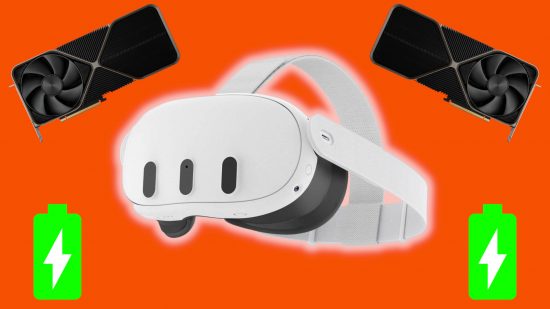A new Meta Quest Link update just dropped bringing a host of welcome additions to the application. While some changes only affect those using a Quest 3, there’s plenty here for users of older headsets too.
The Meta Quest 3 was already our choice for the best VR headset on the market, but this Quest Link update makes the device all the better if you have a gaming PC to connect to. Those with Nvidia GeForce RTX 40 series graphics cards in particular have cause to celebrate.
Looking at the most widespread benefits first, Meta has managed to greatly improve the battery efficiency of Quest Link. For example, connecting to a PC wireless via Air Link with a Quest 3 should see playtime increase from 90 to 140 minutes. It’s unclear what kind of boost you can expect from a Quest 2 or using a battery pack, but any improvement is naturally welcome.
Quest Link now also officially supports every RTX 40 series graphics card, from the RTX 4090 all the way down to the RTX 4050. However, it should be noted that using an RTX 4070, 4060, or 4050 will trigger a compatibility warning banner but Meta says it’s safe to ignore for now. Given that Lovelace GPUs have been around since 2022, I do hope that future generations don’t take nearly as long to receive official support.
The final major upgrade here is that Quest 3 headsets can now operate at 120Hz via Quest Link. However, this isn’t enabled by default, and you’ll need to dive into the settings menu for the device to enable the refresh rate.
Finally, I’d like to highlight the shift in name from Oculus to Meta. While this change was certainly a case of when rather than if, my nostalgia for the rise of Oculus prior to Meta’s acquisition does make me feel somewhat melancholic as one of the last instances of Oculus is scrubbed away. That said, Meta have done well to carry on its legacy in my eyes.
There are a few other minor improvements, including changes to privacy controls and automatic connect features, which you can read about in details on Meta’s blog post. For more on VR, check out our Pimax Crystal review to see what a high-end virtual reality experience really looks like.
